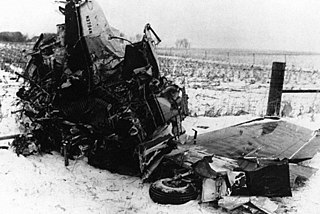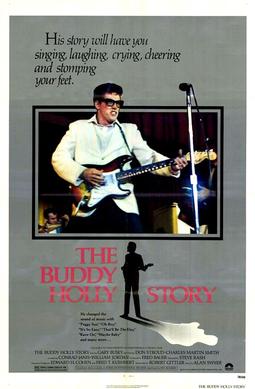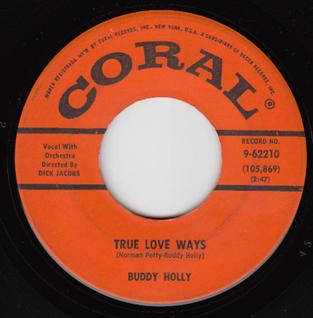Related Research Articles

Charles Hardin Holley, known as Buddy Holly, was an American singer, songwriter, and musician who was a central and pioneering figure of mid-1950s rock and roll. He was born to a musical family in Lubbock, Texas, during the Great Depression, and learned to play guitar and sing alongside his two siblings.

Waylon Arnold Jennings was an American singer, songwriter, musician, and actor. He is considered one of the pioneers of the outlaw movement in country music.

Richard Steven Valenzuela, better known by his stage name Ritchie Valens, was an American guitarist, singer and songwriter. A rock and roll pioneer and a forefather of the Chicano rock movement, Valens died in a plane crash just eight months after his breakthrough.

Breakfast at Tiffany's is a 1961 American romantic comedy film directed by Blake Edwards from a screenplay by George Axelrod and based on the 1958 novella of the same name by Truman Capote. It stars Audrey Hepburn, George Peppard, Patricia Neal, Buddy Ebsen, Martin Balsam, and Mickey Rooney. In the film, Holly Golightly (Hepburn), a naïve, eccentric socialite meets Paul Varjak (Peppard), a struggling writer who moves into her apartment building.

On February 3, 1959, American rock and roll musicians Buddy Holly, Ritchie Valens, and "The Big Bopper" J. P. Richardson were all killed in a plane crash near Clear Lake, Iowa, together with pilot Roger Peterson. The event became known as "The Day the Music Died" after singer-songwriter Don McLean referred to it as such in his 1971 song "American Pie".

The Buddy Holly Story is a 1978 American biographical musical drama film directed by Steve Rash which tells the life and career of rock and roll musician Buddy Holly. It features an Academy Award-winning musical score, adapted by Joe Renzetti and Oscar-nominated lead performance by Gary Busey. The film also stars Don Stroud, Charles Martin Smith, Conrad Janis, William Jordan, and Maria Richwine, who plays María Elena Holly.
María Elena Holly is the widow of American rock and roll pioneer Buddy Holly. As a receptionist at Peermusic, she met with Holly and his band the Crickets on June 19, 1958, and Holly proposed to her after five hours on their first date. Less than two months later, the couple married on August 15, 1958, in Lubbock, Texas. On February 3, 1959, Buddy Holly died in a plane crash along with fellow musicians Ritchie Valens and The Big Bopper outside Clear Lake, Iowa. After learning of her husband's death from the television news, she suffered a miscarriage the following day and could not attend Holly's funeral in Lubbock.

"Not Fade Away" is a song credited to Buddy Holly and Norman Petty and first recorded by Holly and his band, the Crickets.

"Buddy Holly" is a song by the American rock band Weezer. The song was written by Rivers Cuomo and released by DGC as the second single from the band's debut album, Weezer (1994). The lyrics reference the song's namesake, 1950s rock-and-roll singer Buddy Holly, and actress Mary Tyler Moore. Released on September 7, 1994—which would have been Holly's 58th birthday—the song reached number two on the US Billboard Modern Rock Tracks chart and number 18 on the Billboard Hot 100 Airplay chart. Outside the US, the song peaked at number six in Canada, number 12 in the United Kingdom, number 13 in Iceland, and number 14 in Sweden. The song's music video, which features footage from Happy Days and was directed by Spike Jonze, earned considerable exposure when it was included as a bonus media file in Microsoft's initial successful release of the operating system Windows 95.

Norman Petty was an American musician, record producer, publisher, and radio station owner. He is considered to be one of the founding fathers of early rock & roll. With Vi Ann Petty—his wife and vocalist—he founded the Norman Petty Trio.
Bob Montgomery was an American singer, songwriter, record producer and publisher.

Thomas Douglas Allsup was an American rockabilly and swing musician.
Maria Richwine was a Colombian-born American actress who was also the first Latina Playboy Bunny.

"Heartbeat" is a rockabilly song originally recorded by Bob Montgomery and credited to Norman Petty. It was recorded most famously by Buddy Holly in 1958. The B-side of the single was "Well... All Right". "Heartbeat" reached the UK top 10 twice: once in 1975 for Showaddywaddy at number seven and again in 1992 for Nick Berry, recorded as the theme to the television series Heartbeat, which reached number two.

"Oh, Boy!" is a song written by Sonny West, Bill Tilghman and Norman Petty. The song was included on the album The "Chirping" Crickets and was also released as the A-side of a single, with "Not Fade Away" as the B-side. The song peaked at number 10 on the US charts, number 3 on the UK charts in early 1958, and number 26 in Canada.

"True Love Ways" is a song attributed to Norman Petty and Buddy Holly. Buddy Holly's original was recorded with the Dick Jacobs Orchestra in October 1958, four months before the singer's death. It was first released on the posthumous album The Buddy Holly Story, Vol. 2, in March 1960. The song was first released as a single in Britain in May 1960, reaching number 25 on the UK Singles Chart. It was released the following month in the US, but did not make the charts. In 1988, a UK re-release of the recording by MCA, the single reached no. 65 on the UK singles chart in a five-week chart run.

The Buddy Holly Story is the first posthumously released compilation album by Buddy Holly and the Crickets. The album was released on February 28, 1959 by Coral Records less than a month after Holly's death.

"Crying, Waiting, Hoping" is a song written by Buddy Holly. It was released in 1959 as the B-side to "Peggy Sue Got Married". Three versions of Holly's recording were released: the 1959 commercial release, the 1964 reissue with different orchestration, and Holly's original, private home recording.

"Raining in My Heart" is a song recorded by Buddy Holly on October 21, 1958 at the Pythian Temple on West 70th Street in New York City, with the orchestral backing by Dick Jacobs. The music and lyrics are written by the songwriting team of Felice Bryant and Boudleaux Bryant. It was released as a single on Coral Records in 1959, peaking at number 88 on the Billboard chart as the B-side of "It Doesn't Matter Anymore". This recording was included on Buddy Holly's first "greatest hits" compilation album, The Buddy Holly Story, that was released in March 1959.

"It's So Easy!" is a rock-and-roll song written by Buddy Holly and Norman Petty. It was originally released as a single in 1958 by the Crickets but failed to chart. It was the final release by the Crickets when Holly was still in the band.
References
- ↑ Canby, Vincent (July 21, 1978). "Screen: 'Buddy Holly Story'". The New York Times . Retrieved October 27, 2018.
- ↑ Lehmer, Larry (2004). The Day the Music Died: The Last Tour of Buddy Holly, the Big Bopper, and Ritchie Valens. Schirmer Trade Books. p. 175. ISBN 0-8256-7287-2 . Retrieved December 12, 2010.
- ↑ "The Spinning Image". The Spinning Image. Retrieved December 13, 2010.
- ↑ Gary Patterson, R. (June 16, 2008). Title. Simon and Schuster. ISBN 978-1-4391-0364-7 . Retrieved December 13, 2010– via Google Books.